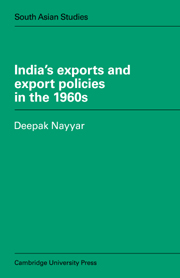Book contents
- Frontmatter
- Contents
- List of tables
- Preface
- Abbreviations
- A note on statistical tables
- Introduction
- PART ONE GENERAL
- PART TWO EMPIRICAL ANALYSIS: A MICRO APPROACH
- 3 Jute manufactures
- 4 Cotton textiles
- 5 Tea
- 6 Cashew and tobacco
- 7 Minerals
- 8 Leather and chemicals
- 9 Engineering goods
- PART THREE POLICY ANALYSIS: A MACRO ECONOMIC VIEW
- Select bibliography
- Index
4 - Cotton textiles
from PART TWO - EMPIRICAL ANALYSIS: A MICRO APPROACH
Published online by Cambridge University Press: 03 May 2010
- Frontmatter
- Contents
- List of tables
- Preface
- Abbreviations
- A note on statistical tables
- Introduction
- PART ONE GENERAL
- PART TWO EMPIRICAL ANALYSIS: A MICRO APPROACH
- 3 Jute manufactures
- 4 Cotton textiles
- 5 Tea
- 6 Cashew and tobacco
- 7 Minerals
- 8 Leather and chemicals
- 9 Engineering goods
- PART THREE POLICY ANALYSIS: A MACRO ECONOMIC VIEW
- Select bibliography
- Index
Summary
Among the less developed countries, India was the first to export cotton textiles on a significant scale. As far back as 1948–1950, she accounted for more than 11 per cent of the world trade in cotton textiles. In the years that followed, the Indian textile industry was unable to maintain its level of exports, as a result of which its share of the world market registered a decline. All the same, until 1960, cotton textiles were an important foreign exchange earner for the country. During the period 1950–1960, they contributed between 10 and 13 per cent of total export receipts each year. In the 1960s, however, their relative importance in India's exports appears to have declined. The share of cotton textiles in export earnings fell from 7.7 per cent in the three-year period 1960/61–1962/63 to 6.3 percent during 1968/69–1970/71.
Table 4.1 outlines the main trends in India's exports of cotton textiles over the decade, and shows that: (a) exports of cotton yarn increased quite rapidly – particularly after 1967; (b) handloom cloth exports remained more or less unchanged except for the peak performance in 1965; and (c) in the first half of the 1960s exports of millmade cloth declined both in value and in quantity. After 1966, however, rupee earnings from mill cloth exports increased rapidly, although the quantity seems to have remained more or less unchanged. This discrepancy can be explained partially by improved unit values and partially by the substantial devaluation of the rupee in June 1966.
- Type
- Chapter
- Information
- India's Exports and Export Policies in the 1960's , pp. 61 - 86Publisher: Cambridge University PressPrint publication year: 1977



